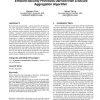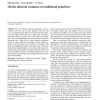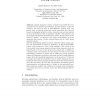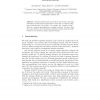49 search results - page 2 / 10 » Lower Bounds on Signatures From Symmetric Primitives |
102
click to vote
CCS
2008
ACM
15 years 1 months ago
2008
ACM
By functionally decomposing a specific algorithm (the hierarchical secure aggregation algorithm of Chan et al. [3] and Frikken et al. [7]), we uncover a useful general functionali...
90
Voted
DC
2006
14 years 11 months ago
2006
Some well-known primitive operations, such as compare-and-swap, can be used, together with read and write, to implement any object in a wait-free manner. However, this paper shows ...
127
Voted
EUROCRYPT
2003
Springer
15 years 4 months ago
2003
Springer
Abstract. Digital Signatures emerge naturally from Public-Key Encryption based on trapdoor permutations, and the “duality” of the two primitives was noted as early as Diffie-He...
95
Voted
EUROCRYPT
2001
Springer
15 years 4 months ago
2001
Springer
Message integrity from one sender to one receiver is typically achieved by having the two parties share a secret key to compute a Message Authentication Code (MAC). We consider the...
COLT
2001
Springer
15 years 4 months ago
2001
Springer
Intrinsic complexity is used to measure the complexity of learning areas limited by broken-straight lines (called open semi-hulls) and intersections of such areas. Any strategy le...




